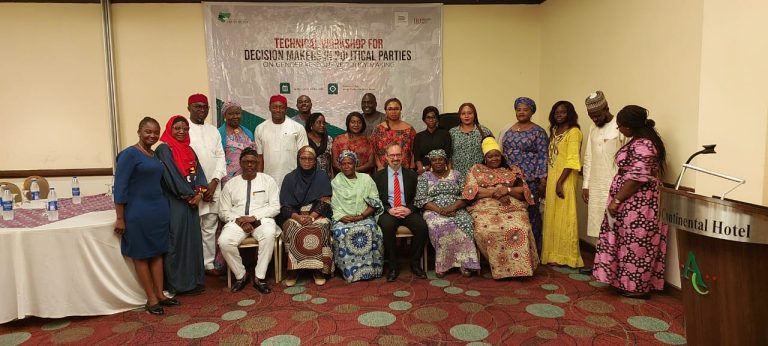By Justina Auta
Political parties have been blamed for the poor representation of women in the country’s political space.
Ms. Mufuliat Fijabi, the Chief Executive Officer of the Nigerian Women Trust Fund (NWTF), stated this during a technical workshop for political parties on gender-responsive policy-making in Abuja.
Fijabi, who decried the low number of women elected representatives in the 2023 general elections, urged political parties to encourage and support women by ensuring a level playing ground within the party structure through gender inclusion.
She said: “The level of gender inclusion in Nigeria’s political space is still very low, it’s extremely poor.
“This election has shown us that we have a long way to go when it comes to the inclusion of women and when it comes to women emerging as elected representatives.
“And that’s why we will not leave political parties alone because we know if there is an enabled level playing ground within political parties more women will emerge.
“They will emerge not only as candidates for political parties but as elected representatives.
“So we are holding all political parties in Nigeria accountable for low representation of women in the political space.”
Mr. Santiago Stocker, Nigeria’s Resident Programme Director at, International Republican Institute (IRI), underscored the need for more strategies to ensure gender-responsive policy-making in the country.
“Policy making has become a critical part of the governance process, and the integration of gender in the policy process will help to address the challenges of women’s participation and service delivery.
“This is important not just for internal party democracy and inclusion. It is also important because of the role that political parties play towards increasing women’s political participation in the overall process,” he said.
According to him, political parties are a microcosm of the larger political process.
“If parties are exclusive, detached, and secretive decision-making bodies, this will be reflected in the overall political system.
“If parties are inclusive, transparent, and dedicated to policy making that addresses the needs of their supporters and constituents, that will also be reflected in the overall political system.
“This will be a very positive step forward,” he said.
On her part, Ms. Dudu Manuga, the National Women Leader of, the Labour Party, said the party was building the capacity of women to take up major leadership roles within its structure and beyond.
She said: “Our aim is that by 2027, when we have our party’s congresses, we will have more women in the party structure, not just women leaders.
“We have started encouraging women to come out, it’s not a men’s world, politics is for both men and women.
“If we don’t have women on the table, the issues of women cannot be carried out properly in governance.”
Manuga identified inadequate funding, male patriarchy, culture and traditions, godfatherism, poor mentorship, and capacity building as well as poor media visibility as some impediments against women’s political participation.


